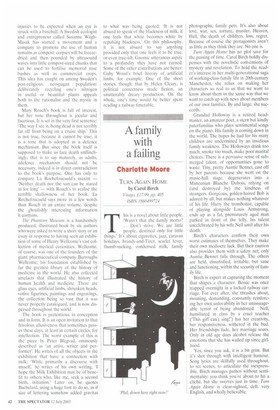A family with a failing
Charlotte Moore
TURN AGAIN HOME by Carol Birch Virago, i'17.99, pp. 405 ISBN l860449724
his is a novel about little people. 'Wasn't that the family motto? ... Don't strive, We are little people, destined only for little things.' It's about cigarettes, jazz, caravan holidays, brandy-and-Tizer, scarlet fever, thumb-sucking, condensed milk, family photographs, family pets. It's also about love, war, sex, torture, murder, Heaven, Hell, the death of children, loss, regret. Because of course the protagonists aren't as little as they think they are. No one is.
Turn Again Home has no plot save for the passing of time. Carol Birch boldly dispenses with the novelistic conventions of mystery and revelation. To hold the reader's interest in her multi-generational saga of working-class family life in 20th-century Manchester, she relies on making her characters so real to us that we want to know about them in the same way that we want to catch up with news about members of our own families. By and large, she succeeds.
Grandad Holloway is a retired headmaster, an amateur poet, a stern but kindly paterfamilias who plays sentimental songs on the piano. His family is coming down in the world. The hopes he had for his many children are undermined by an insidious family weakness. The Holloways drink too much, smoke too much, make poor marital choices. There is a pervasive sense of submerged talent, of opportunities gone to waste. Tiny, pretty Auntie Bennet, cast off by her parents because she went on the music-hall stage, degenerates into a Mancunian Blanche Dubois, relying on (and destroyed by) the kindness of strangers. Gorgeous, golden-haired Bob is adored by all, but makes nothing whatever of his life. Harry the trombonist, capable of playing alongside Louis Armstrong, ends up as a fat, prematurely aged man parked in front of the telly, his talent uncelebrated by his wife Nell until after his death.
Birch's characters confirm their own worst estimates of themselves. They make their own mediocre luck. But their caution also provides them with a safety net; only Auntie Bennet falls through. The others are held, dissatisfied, irritable, but sane and functioning, within the security of family life.
Birch is expert at capturing the moment that shapes a character. Bessie was once trapped overnight in a locked railway carriage. For ever after, she thrashes about, moaning, demanding, constantly reinforcing her own unlovability in her unassuageable terror of being abandoned. Nell, humiliated in class by a cruel teacher (`This girl can't sing!) has her creativity, her responsiveness, withered in the bud. Her friendships fade, her marriage sours. Only in old age does alcohol release the emotions that she has walled up since girlhood.
Yes, since you ask, it is a bit grim. But it's shot through with intelligent humour. Song lyrics are skilfully used throughout, to set scenes, to articulate the inexpressible. Birch manages pathos without sentimentality; you think you're about to hit a cliché, but she swerves just in time. Turn Again Home is clear-sighted, deft, very English, and wholly believable,


































































 Previous page
Previous page